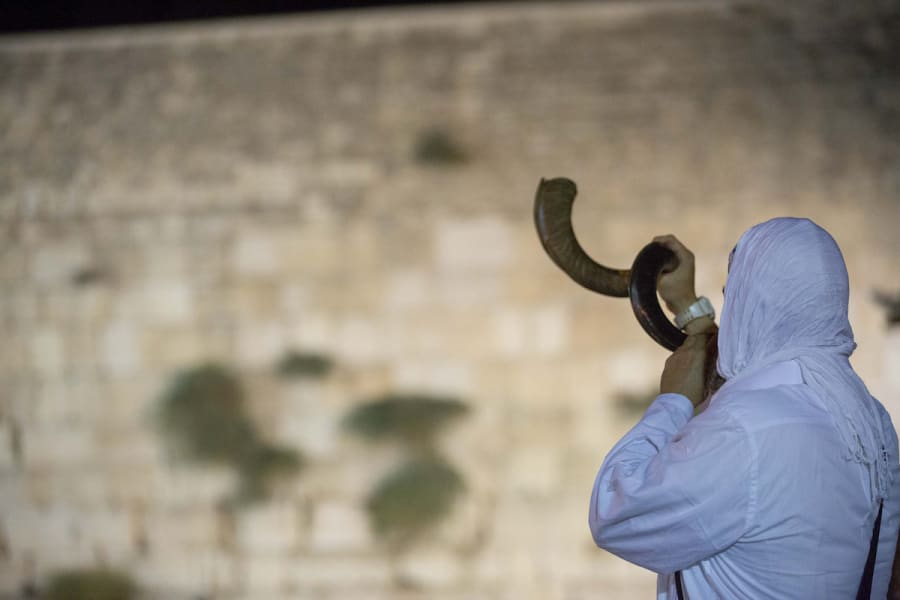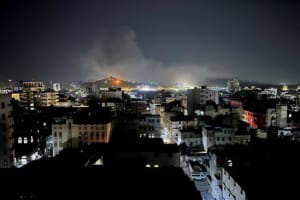THE WEEK AHEAD: Jews celebrate Rosh Hashanah, thousands of Orthodox pilgrims flock to Uman, Ukraine, despite warnings; heightened security alert in Israel
Here are the stories we are watching...

The Jewish New Year
Heightened security alert
Hasidic Pilgrimage to Ukraine
Israel-Chile diplomatic drama
Israel-Lebanon maritime dispute
THE JEWISH NEW YEAR
The holiday of Rosh Hashanah, the Jewish new year, will begin the evening of Sunday, Sept. 25, and run through Tuesday, Sept. 27. The holiday marks the start of the holiest season in Judaism – the 10 days between Rosh Hashanah and Yom Kippur – a time dedicated to engagement in self-reflection and repentance. Jews traditionally celebrate the High Holy Days by feasting (or fasting) with their families and going to the synagogue to hear the blowing of the shofar (ram’s horn), which is considered both a blessing and a divine commandment. They greet their loved ones by wishing them a “sweet new year" and symbolically eat apples dipped in honey.
HEIGHTENED SECURITY ALERT
Israeli security is on high alert ahead of the holiday. Last week saw several terror attacks and confrontations between Israeli security forces and Palestinians in Judea and Samaria, and the country unfortunately is bracing for more. The Israeli security establishment – the Israel Defense Forces, the Israel Security Agency or “Shin Bet” and the Israel Police – is preparing for another potential uptick in violence.
Last week, Hamas spokesperson Hazem Qasem warned that “the attacks will escalate in the coming days, in light of the Zionist oppression against the Al Aqsa mosque.” The threat marks a time of increased visits to the Temple Mount by Jews observing the holiday period.
HASIDIC PILGRIMAGE TO UKRAINE
Thousands of Israeli Orthodox Jews are planning to visit the tomb of Rabbi Nachman of Breslov during the High Holy Days as they do every year. The only problem: The pilgrimage site is south of Kyiv, in Uman, a city in the center of war-torn Ukraine. According to The Jerusalem Post, around 10,000 Israelis are expected to make the pilgrimage, despite Israel warning against it and the high cost of a 15-hour flight to get there. Both Russia and Ukraine have said that they cannot guarantee the safety of the Jewish worshippers in Uman.
Ukraine’s Ministry of Foreign Affairs urged Hasidic pilgrims to refrain from this year’s pilgrimage, “given the real threats to people’s lives and safety.” Each year, the site attracts tens of thousands of Orthodox pilgrims, and many are undeterred by the fact that Russian missiles targeted the city in the early weeks of the war.
ISRAEL-CHILE DIPLOMATIC DRAMA
After an unprecedented diplomatic incident, Israel’s Ambassador to Chile Gil Artzyeli will get to present his credentials to the country’s President Gabriel Boric Font on Friday, Sept. 30. Boric canceled Artzyeli’s formal acceptance ceremony, which originally was scheduled for last week, after the Israeli diplomat had already arrived at the presidential residence. Chile’s Foreign Ministry cited “the political sensitivity” surrounding the death of a 17-year-old Palestinian during an IDF operation in the Judea-Samaria region as the reason for the decision.
The left-wing Chilean president has long been known for his anti-Israel stance; he once referred to Israel as a “murderous state” and has expressed his support for the boycott of Israeli goods produced in the Biblical heartland of Judea and Samaria.
ISRAEL-LEBANON MARITIME DISPUTE
Indirect negotiations between Israel and Lebanon over their maritime border could see significant progress this week, as U.S. mediator Amos Hochstein is expected to send a draft agreement to both sides. Hezbollah leader Hassan Nasrallah threatened to attack Israel if it begins the extraction of oil and gas from the Karish field located in the disputed waters. During his visit to New York last week for the UNGA, Israeli Prime Minister Yair Lapid expressed cautious optimism regarding the prospects of reaching a deal with Lebanon about the shared border.
However, the Israeli opposition led by former Prime Minister Benjamin Netanyahu, slammed Lapid for entering a deal they say will hand to an enemy state Israeli territories worth billions of dollars, without allowing any discussion of the issue in the Knesset, the Israeli Parliament. Netanyahu said that “Lapid, who opposed the extraction of our gas in the first place, is now giving a gas field to Nasrallah.” In response, Lapid accused Netanyahu’s campaign video of causing damage to the maritime negotiations.
This week we are also keeping an eye on these developing stories:
… Who is Iranian President Raisi? A terror master who oversaw mass execution of Iranians
… Is Armenia, the world’s first Christian nation, in danger of disappearing?
… What does the Bible say about the importance of the red heifer and the Third Temple?
… Why was the Queen's funeral more bold about Christ than many Western churches?

The All Israel News Staff is a team of journalists in Israel.














